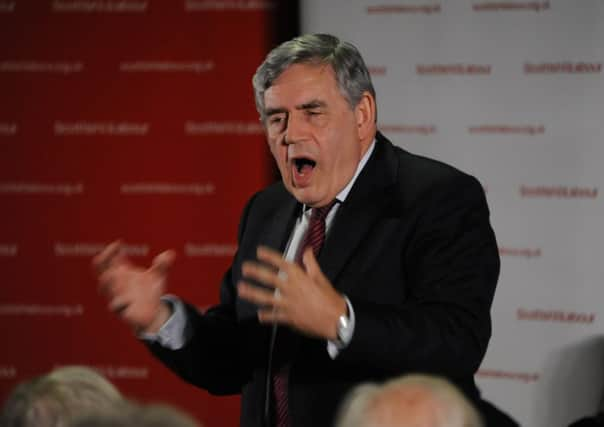Scottish independence: Brown in elderly voter plea


Mr Brown drew on the Blitz spirit and the shared history of the four nations of the United Kingdom to inspire a No vote tomorrow.
Advertisement
Hide AdAdvertisement
Hide AdHe told an audience of Labour activists in Clydebank town hall that Scots had been the creators of the welfare state and NHS but understood they worked better with the pooled resources of the UK.
He said: “To people who are elderly to people who have lived through the last 50, 60 years there is a message we should give to young people. Tell them something.
“Tell them we had to fight a war to ensure peace in this country; tell them that we built a peace, tell them that together we built the welfare state; tell them together we built a national health service; tell them that the principles that underline our country are the same to day and tomorrow. That we share and cooperate that we work togetyher, that we plan for the future together that we manage to distributre the resources of our country fairly together, that we realise in the future we will have to live together.
“There is no alternative in my view but to consider a patriotic No vote.”
Drawing on the Second World War, he said that Clydebank and Coventry had “suffered most cruelly” in the Blitz outside the metropolitan areas.
He said: “It makes us remember that there were Scots, English, Welsh and Irish who fought side by side during that Second World War. There is not a battlefield in Europe where we did not fight with one another there is not a cemetery where you do not find Scots, English Welsh and Irish lying side by side.
“When someone was injured nobody asked whether you were Scots, English Welsh or Irish because we were in a common fight all working together.”
And in a speech also inspired by the social history of Scotland in the UK, he remembered Clydebank had helped to inspire the welfare state.
Advertisement
Hide AdAdvertisement
Hide AdHe said: “Just after the First World War massive unemployment in this area right across the and people got together, the miners and the shipbuilding workers and political leaders and said we cannot survive with an old Scottish poor law.
“We Scots could have had our separate Scottish welfare state.
“But the Scottish leaders of the day and the Scottish people said no, the fairest way of solving the problems of welfare of unemployment of sickness of disability of providing pensions was to pool our resources across the whole of the UK so 63 million people contribute to the costs and the benefits of the welfare state instead of pooling among only five million people in Scotland.”
SEE ALSO